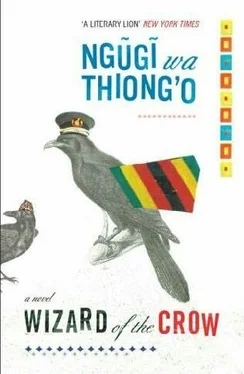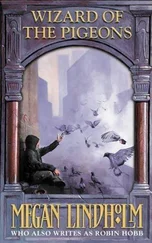What are ogres? they now wanted to know, and Nyawlra explained that the maritnü were humanlike creatures who sometimes fed on humans, including little children. The creatures had two mouths, one in front and the other at the back of their heads, and they ate flies through the mouth at the back. Otherwise the mouth at the back was well concealed by the creature’s long hair, which fell over its shoulders.
“Like my mother’s hair?” Gacirü asked.
“Gacirü, are you saying that your mother is an ogre?” interjected Vinjinia, laughing.
“My mother is not an ogre,” said Gaclgua. “She does not eat other humans.”
“Tell us the story” they said in unison.
A certain blacksmith went to an iron smithery far away. In his absence, his pregnant woman gave birth to two children.
“Like us two,” Gacirü said in a tone between a question and a statement.
“Yes, like you two, a boy and a girl, but in their case they were twins.”
“What were their names?” Gaclgua asked.
Nyawlra was caught off-guard, for in the version she had received the children had no names.
“At the time of the events of the story, the woman had not given them names,” she said.
“Why?” Gacirü asked.
“Because it was an ogre who helped her deliver and who now nursed her, and she did not want the ogre to know their names,” Nyawlra improvised again.
“Why did the ogre do all that?” Gacirü asked.
“Silly Because the husband was not there,” Gaclgua chimed in.
“Mummy! Mummy, Gaclgua is calling me silly!”
“Stop it, you two,” Vinjinia shouted from where she was, “or I shall ask Nyawlra not to tell you stories anymore.”
The ogre was really a very bad nurse. After cooking food, he would dish it out and put the plate in front of the woman, but as soon as she stretched her hand to pick it up the ogre would quickly take the dish away and say: “I see you don’t want to eat my food, but it is all right, I will eat it for you.” The ogre did the same with water: “You don’t want it? I shall drink it for you.”
‘Gaclgua teases me in the same way,” Gacirü complained.
“You do the same to me,” Gaclgua shot back.
They argued back and forth, each accusing the other of the same mean crime, and they would have gone on except for Nyawlra’s warning them that if they did not stop the story would disappear.
“Tell us what happened next,” they pleaded.
All four grew big tummies: of kwashiorkor for mother and children and of fat for the ogre.
One day the woman saw a weaverbird in the yard.
“Is that the same weaverbird that you sang about?” Gacirü asked.
“Which one?” Nyawlra asked, for she had forgotten about the earlier song.
“How can she tell the story if you two keep on interrupting her with endless questions?” Vinjinia interjected.
“We shall not ask anymore,” Gacirü and Gaclgua said together, “until the end.”
In exchange for castor oil seeds, the bird agreed to take a message to the blacksmith far away. Nyawlra described how the bird flew and flew and flew until it finally reached the smelting yard and landed on the branches of a tree. It was very tired, but it sang.
Blacksmith smelting iron
Make haste, make haste
Your wife has given birth
With the ogre as the midwife
With the ogre as the nurse
Make haste, make haste
Before it is too late
Nyawlra asked Gaclgua and Gacirü to join in the singing so that they would help in defeating the ogre. The weaverbird jumped from tree to tree, trying to attract the smith’s attention. Now, the blacksmith was with others, and at first they simply chased it away as a nuisance, but seeing the bird’s persistence they took the time to listen to it more carefully. It was then that the blacksmith remembered that he had left a pregnant wife behind and realized that the bird was telling him of the danger facing his wife and children. He gathered his spear and shield and ran as fast as his legs could carry him, soon reaching home, where he joined his wife and children, and with their combined strength they were able to defeat the evil creature.
“Did you say their combined strength?” Gacirü asked. “I thought that babies cannot fight?”
“Or women?” added Gaclgua.
“Who told you that women cannot fight?” asked Gacirü. “Me, I cannot let a boy, any boy, beat me without fighting back,” Gacirü said, glaring at Gaclgua.
“I talked about their strengths, big and small, being combined,” Nyawlra told them, explaining how the babies cooperated by not crying too much and how the woman, though weak, gave the husband all the details she had learned about the ogre and even suggested the best way of defeating the big ogre, for by now she knew all about the evil creature. She would taunt him to distract him while the husband came out of his hiding place to attack. And that was exactly what happened.
They spent the day spinning tales, songs, and riddles, and the scene was the same the next day. To Gacirü and Gaclgua, this was the perfect midterm break, and they hoped all of life would be like that: an endless festival of storytelling with Nyawlra as the sole narrator, for she could change her voice to sound like a bird, a lion, an old woman, a man, a child, anything. They liked stories of the trickster hare the best, though they were fascinated by the scary ones of the ogre.
Indeed, a couple of days later, Gacirü revisited the issue of ogres and the second mouth concealed under a thick mass of long hair. This time Gacirü had Nyawlra all to herself and sat on her lap. Vin-jinia and Gaclgua were looking through the window at the never-ending queue outside.
“You know, I have been thinking about the story of the ogre, and I don’t think that it was their hair alone that hid the mouth at the back. Both the mouth and the hair were hidden under the hats the ogres wore. Don’t you think so? Hats can also hide the mouth, can’t they? Like those worn by those policemen outside? Tell me, are policemen ogres?”
“Sssh!” Vinjinia said from where she sat by the window.
“That’s clever,” Nyawlra said. “I mean about the hats. How did you work it out?”
“It is simple. My mother has long hair but she does not wear a hat. Therefore, Mummy” she now called out, “you are not an ogre.”
“Thank you,” Vinjinia said. “Is that what has been waking you up at night, making you turn my hair over?”
“You see, Mummy, ogres are bad and cunning and they can make themselves look like somebody else. In school the teacher read to us the story of Red Riding Hood and how she went to see her sick grandmother, and you know what, Mummy? The girl found a big bad wolf hiding in the bed, pretending to be the grandmother. And you know what? The wolf had already eaten the grandmother…”
Gaclgua, who had seemed not to be following the conversation, now shouted a question.
“Do ogres ride motorcycles?”
“Why?” asked Nyawlra.
“A stranger on a motorbike is riding this way…”
The rider returned after seven days and, to some, he sounded like a madman. There was continuity to his narrative, all right, but he kept rolling his eyes as if to show that even he found it difficult to believe the story he was telling his debriefers.
Those privy to his report tell of his amazing claim that for seven days, he, the rider, one hand holding a bullhorn, the other steering the motorcycle, had done nothing but follow the queue; he did not even get off his vehicle but actually slept on it while still in motion, for, aware of his duty as a loyal police officer, he wanted to reach the end of the queue as soon as possible so as to give a report both prompt and thorough. But whenever he thought that he was nearing the end, he found that more job seekers had already gotten in line.
Читать дальше












